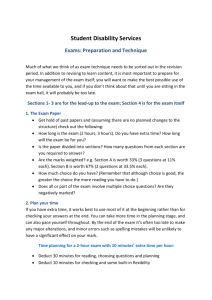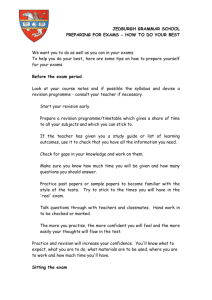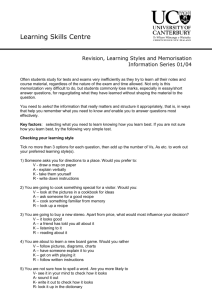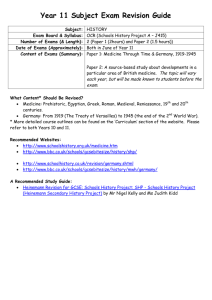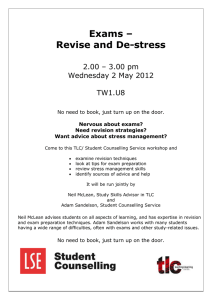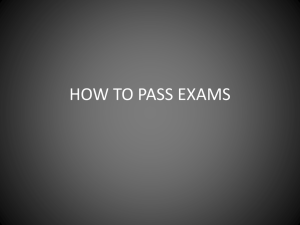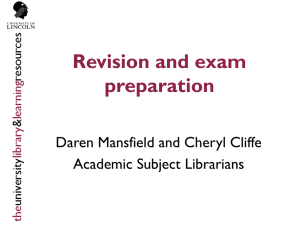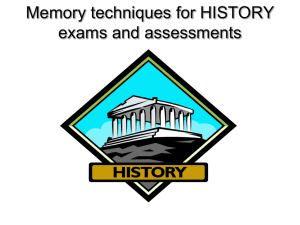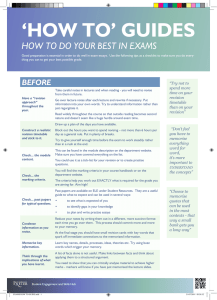EXAM REVISION
advertisement
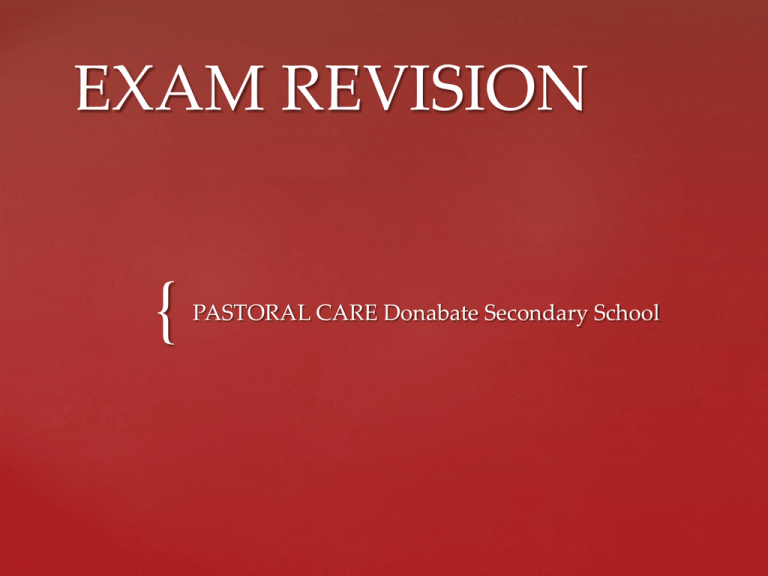
EXAM REVISION
{
PASTORAL CARE Donabate Secondary School
Tips & Techniques
The odd hour here and there isn't enough. Make a
revision plan you can stick to, with a daily outline that includes
times for breaks and meals.
Know your strong and weak subjects and mix them up
on your timetable, don't do all the nightmare topics at once.
Set targets that you know you can reach and tick them
off as you accomplish them.
You will need help at some point, ask parents, siblings,
teachers and friends for support.
Find somewhere quiet to revise. You could also try working
with other people but, if you can't concentrate, save gettogethers for breaks from the books.
Put your exams into perspective, they are only one aspect
of life.
Make your own revision notes. You'll learn as you
write and, once you've got them, you're halfway there.
2.
Be brief. Check the syllabus or ask a teacher to make
sure you've got the key areas sussed.
3.
Concentrating on the plus points of revision helps
keep you going. Start by thinking how much easier you'll
find the exams.
4.
Don't overdo it. Your concentration lapses after a
couple of hours, so take regular breaks.
5.
Experiment with different revision techniques. Variety
beats boredom.
6.
Focus. Don't make pointless notes. Look at past exam
papers and see how questions could be asked.
7.
Get confident. If you're positive about exams, you
should take in more information and remember it when it
counts.
1.
Seven Rules Of Revision
1.
Condense. Fitting notes onto one side of paper makes
them easier to stomach, so rewrite and cut down as you go.
2.
Highlight. Target key areas using colours and symbols.
Visuals help you remember the facts.
3.
Record. Try putting important points, quotes and
formulae on tape. If you hear them and read them, they're more
likely to sink in.
4.
Talk. Read your notes out loud, it's one way of getting
them to register.
5.
Test. See what you can remember without notes, but
avoid testing yourself on subjects you know already.
6.
Time. Do past exam papers against the clock, it's an
excellent way of getting up to speed.
Six Simple Techniques
In the exam, when told to open the paper, do not begin
writing until you have familiarised yourself with the questions
and read through the first question slowly and carefully. If you
have a choice of questions, some students select the easiest first.
This helps build confidence.
Underlining key words in a question may help you to
focus you thoughts and jog your memory.
Structure answers using a plan. This is crucial when
writing essays. If you have three essays to write, you may want
to plan them all first before you write them. Make sure you plan
your time well if you do this.
Allocate your time according to the mark allocations
given for each question. Why write ten lines for a two-mark
question when you could be using that time to attempt a longer
question with more marks available?
During the Exam1
Answering three questions quite well is usually better
than answering one very well and leaving the other two
untouched or badly done. Nothing comes from nothing!
If you think you know the answer, you probably
do! No marks are available for writing nothing. If you
are really stumped, don’t panic. Try and remember
something your teacher said one day all those months
ago. If you really can’t answer a question, forget it and
move on to the next one.
Exams at are not designed to trip you up. They
are there to allow you to demonstrate your knowledge.
You might even enjoy your examinations! Have
confidence in your own ability.
During the Exam 2
